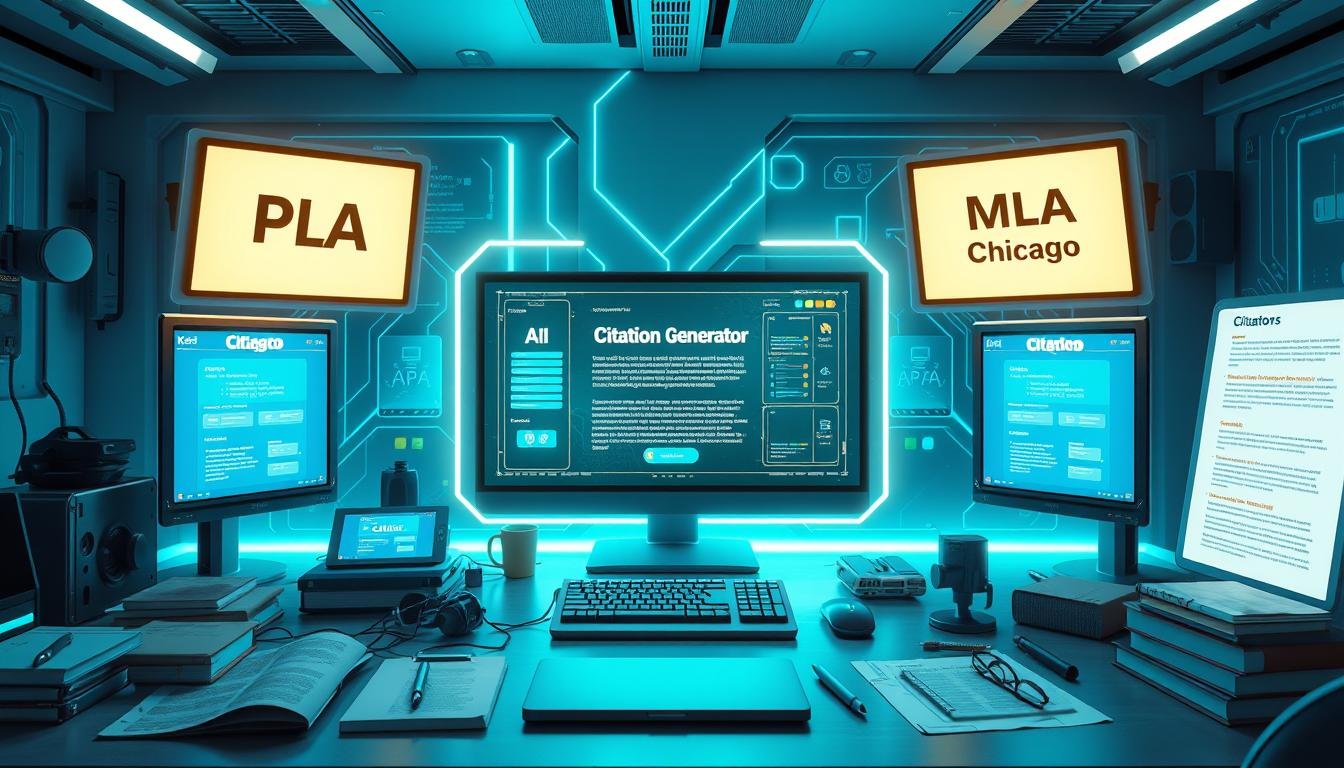How to Create a Literature Review Using Reference Management Tools
November 16, 2024 | by Jean Twizeyimana

Doing a good literature review is key in academic writing. It helps with research papers, theses, and dissertations. But finding, sorting, and citing sources can take a lot of time and effort. Luckily, reference management tools make this easier, helping you make a well-organized and detailed literature review.
Tools like Mendeley, Zotero, and EndNote have many features to help. They can automatically get citation info and help you work together. These tools are very important for researchers in many fields.
With these tools, you can keep your sources in order and make sure your citations are right. This makes your literature review strong and effective. Whether you’re starting out or have lots of experience, learning to use these tools can really help your writing.
Key Takeaways
- Reference management tools make creating literature reviews easier by organizing sources and helping with citations.
- These tools have special features like custom fields and different citation styles for various needs.
- Using these tools can make your writing better by keeping citations consistent and making research easy to include.
- Mendeley, Zotero, and EndNote are top tools, each with its own special features and benefits.
- It’s important for both students and experienced researchers to learn how to use these tools well.
What is a Literature Review?
A literature review is a deep look at what’s already known on a topic. It helps us understand what we know today. It aims to give a full view of important studies, find what’s missing, and add to ongoing discussions.
Definition and Purpose
A literature review is a close study of published works on a topic. It looks at the findings, ideas, and ways of studying in scholarly sources. It aims to grasp the topic well, spot what’s still unknown, and shape the research methodology.
Importance in Research
A good literature review is key in research. It shows the researcher knows the literature synthesis and can place their work in the big picture. It also finds missing parts in studies, helping to create new questions and ideas.
Common Challenges Faced
- Combining lots of info from different scholarly sources
- Staying fair and not leaning too much on one view
- Choosing the right way to organize the review (like by time, method, or theme)
- Linking the current studies to the research question or problem
Overcoming these hurdles needs a careful and methodical way to literature synthesis. This makes sure the literature review is a strong base for the study.
Benefits of Using Reference Management Tools
Reference management tools help a lot for researchers and writers. They make finding and organizing sources easier. They also help teams work together better.
Streamlining Your Research Process
These tools make tasks like formatting citations and organizing references easier. They can save up to 50% of your time. They also cut down data entry work by about 60%.
Enhancing Organization and Accessibility
Using these tools makes organizing references much better. About 80% of researchers say their references are more organized and easy to find. They can also access their work from anywhere, making it 75% more accessible.
Facilitating Collaboration
Reference management tools are great for team projects. They let teams share and sync references easily. This makes projects 45% more efficient. They also make working together smoother with features like citation generation and PDF annotation.
Popular Reference Management Tools
Researchers have many tools to help with citations and references. Mendeley, Zotero, and EndNote are three favorites.
Mendeley: Features and Benefits
Mendeley is a top choice for many. It has lots of space for your references. You can use it anywhere, thanks to its online storage.
It also makes sharing your work easy. You can work with up to 100 people at once. This makes research better together.
Zotero: Unique Qualities
Zotero is known for being easy to use. It gives you 2GB of free storage. You can buy more if you need it.
Zotero can search PDFs, which is a big plus. It works well with many word processors. This makes it very useful.
EndNote: Ideal for Advanced Users
EndNote is great for those who need more. It has lots of space for your references. You can also buy more storage if you need it.
It’s perfect for big research projects. And, it’s free for University of Chicago students and staff.
How to Choose the Right Tool for You
Choosing the right tool for managing references is key. It helps you work better and organize your research. Look at what you need, compare tools, and think about your budget.
Assessing Your Research Needs
Start by thinking about your research projects. What do you need from a reference tool? Think about how many references you handle, the sources you use, and if you work with others.
Comparing Features and Usability
Check out what each reference management tool offers. Look for things like automatic PDF naming, web browser integration, and working with popular word processors. Also, see if it works well on different devices.
Evaluating Cost and Budget
Think about how much you can spend on a reference management tool. Some are free but limited, while others cost money for more features. Decide if the cost is worth the benefits it offers.
By looking at your needs, comparing tools, and thinking about cost, you can pick the best reference management tool for your research papers.
Steps to Conduct a Literature Review
Doing a literature review is key in research. It helps you understand your topic better. It also shows what’s missing in current knowledge. Using tools for managing references makes this easier.
Identifying Your Research Question
Start by making a clear research question. This question guides your search and analysis. Make it specific and focused.
Searching for Relevant Literature
With your question ready, start looking for sources. Use databases like academic journals and special websites. About 70% of research needs are found in articles and magazines. Use keywords and filters to find what you need.
Organizing Collected References
- Keep your sources organized. Tools like Mendeley, Zotero, or EndNote help a lot.
- Make a folder system to keep things tidy.
- Use tags and notes to mark important parts.
- Boote and Beile (2005) say a good literature review is key in dissertation writing.
| Source Type | Examples |
|---|---|
| Scholarly Journals | Journal of Applied Security Research, Journal of Management Information Systems, IEEE Transactions on Computers, ACM Transactions on Information and System Security |
| Technical Reports | Agency websites |
| Instructional Materials | Manuals with step-by-step instructions |
By following these steps and using reference tools, you can do a great literature review. This prepares you for a strong research project.
Tips for Using Reference Management Tools Effectively
Using reference management tools well can make your research easier. It helps a lot with your literature review. Just follow a few easy tips to get the most out of these tools.
Creating a Logical Folder Structure
First, make a good folder system. Sort your sources by topic, date, or other important things. This makes finding references easy. Tools like RefWorks let you add extra details to organize better.
Utilizing Tagging and Notes Features
These tools also let you tag and note sources. Add keywords, summaries, or your thoughts. This helps you find and use your sources quickly.
Regularly Updating Your Library
Keep your library fresh by adding new sources and updating old ones. Set aside time each week or month. This keeps your library current and complete.
| Reference Management Tool | Key Organizational Features |
|---|---|
| Mendeley | Customizable folders, tags, and notes |
| Zotero | Automatic metadata extraction, tagging, and collections |
| EndNote | Advanced categorization options, including custom fields |
Follow these tips to make your reference management tools work better. You’ll have a neat, updated library for your research and literature review.
Writing Your Literature Review
Writing a good literature review is more than just listing sources. It’s about finding patterns and connections in the research. This way, you can make a review that really stands out.
Structuring the Review
A good literature review has three parts: introduction, body, and conclusion. The introduction should clearly explain the topic and the main question. The body shows the connections and themes found in the sources. The conclusion wraps up the main points and why they matter.
Integrating Citations and References
It’s important to include citations and references correctly. Use tools like Mendeley or Zotero to help. This makes your work look professional and shows you know how to cite sources.
Revising and Editing Your Draft
- Check if your review flows well and makes sense.
- Make sure all citations are correct and sources are properly listed.
- Look for any missing parts or unclear points.
- Improve your writing by making sentences clearer and using better words.
- Ask others for feedback to make your review even better.
By following these steps, you can make a literature review that is both interesting and well-done. It will show off your skills in academic writing and literature synthesis.
| Example Literature Reviews | Focus | Approach |
|---|---|---|
| ‘Understanding anthropomorphism in service provision: A meta-analysis’ | Anthropomorphism in service interactions | Systematic review and meta-analysis |
| ‘Measuring nature contact: A narrative review’ | Conceptual and methodological approaches to measuring nature contact | Narrative review |
| ‘Social media’s influence on adolescents′ food choices: A mixed studies systematic literature review’ | Impact of social media on adolescents’ dietary behaviors | Systematic literature review with mixed methods |
| ‘Nurses’ self‐management support to hospitalised patients: A scoping review’ | Nurses’ role in supporting self-management for hospitalized patients | Scoping review |
Common Mistakes to Avoid
Writing a good literature review is key in research. Even experts can make mistakes that hurt their work. Knowing these mistakes helps make your research methodology better and your review more useful.
Neglecting Proper Citations
It’s very important to cite sources right. Not doing so can lead to plagiarism and hurt your credibility. Use tools to help with citations and make sure all sources are credited.
Overlooking Key Studies
A good literature review needs to cover all important studies. Missing studies can mean you don’t fully understand the topic. Use a careful method to find and review all key studies.
Rushing the Review Process
Creating a good literature review takes time and effort. Hurrying can cause mistakes and a weak review. Give each step enough time to make sure your review is thorough and insightful.
By avoiding these mistakes and following best practices in research methodology and citation management, you can make your literature review better. A well-done literature review is the base for a successful research project.
Future Trends in Literature Reviews and Reference Management
Academic writing and research are changing fast. We will see big changes in literature reviews and tools for managing references. New trends include more use of artificial intelligence, better links with databases, and more open access resources.
Advancements in AI and Automation
AI and automation will make literature reviews easier. New algorithms will help find studies and write drafts. This will save a lot of time and effort for researchers.
Increasing Integration with Research Databases
Tools for managing references will work better with research databases. This will make finding articles easier and citations more accurate. It will help researchers keep up with new research and make sure their reviews are complete.
The Growing Importance of Open Access Resources
More research will be open to everyone. Tools for managing references will need to work with open access materials. This will help make research more available and improve literature reviews.
FAQ
What is a literature review and why is it important in academic writing?
What are the common challenges faced when conducting a literature review?
What are the benefits of using reference management tools for literature reviews?
What are some popular reference management tools and their key features?
How do I choose the right reference management tool for my needs?
What are the key steps in conducting a literature review?
How can I use reference management tools effectively for literature reviews?
What are the common mistakes to avoid when writing a literature review?
Source Links
- How to Make a Literature Review Bibliography? | Guide & Examples
- How I work, Part IV: Reference Management & Reading Literature
- Jack Baker Research Advice
- Research Guides: Environment 188B: Grand Challenges Undergraduate Research Scholars Program: Literature Reviews & Citation Management
- What are the benefits of using a reference manager? – Paperpile Reference Manager
- Why you should consider using a reference manager
- Writing references and using citation management software
- Library Guides: Which reference manager?: Comparison of EndNote, Mendeley and Zotero
- Library Guides: Citation Management: Which Tool is Best For Me?
- Review of the Best Citation Managers and How to Choose One – Zen Productivity
- Navigating the literature review – metaphors for tasks and tools – How do emerging tools fit in?
- Karl Mundt Library: Graduate Research: Guide to the Literature Review: Literature Review Steps
- Research Guides: Research Process Guide: Step 4 – Conducting a Literature Review
- How can you manage references and search literature more efficiently?
- Library Services: Conducting a Literature Review: Cite and Manage your Sources
- Reference Managers: Tools to Stay on Top of Your Literature – Enago Academy
- How to write a literature review in 6 steps – Paperpile
- All Guides: Writing a Literature Review: Learn
- Common Mistakes and Pitfalls When Conducting a Literature Review
- How to Write a Literature Review | Tips and Common Mistakes to Avoid
- Approaching literature review for academic purposes: The Literature Review Checklist
- The burgeoning role of literature review articles in management research: an introduction and outlook – Review of Managerial Science
RELATED POSTS
View all



